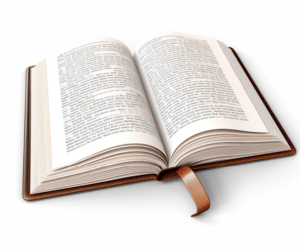There are many different literary styles that God used in bringing His word to us. He has done this, in part, because some styles are better at conveying a certain message than others. It is important to interpret Scripture according to its literary styles to grasp better what is being said. For example, when the Bible says that God “shall cover yo u with His feathers, and under His wings, you shall take refuge…” (Psalm 91:4), it’s imperative to understand that poetic language is being used and not historical narrative.
u with His feathers, and under His wings, you shall take refuge…” (Psalm 91:4), it’s imperative to understand that poetic language is being used and not historical narrative.
It’s also important to know that some books of the Bible even contain different literary styles within the very same book. Let’s look at some of those styles found in God’s Word.
Epistle/Letter
Epistles were personal correspondences written to a particular party. They were written for a particular church or individual and often addressed several topics. These letters were written with a familiarity of the areas or problems being discussed and with an apostolic tone of authority. We find value in these epistles in providing us with timeless truths on difficult issues that still arise today.
Some Epistles are Romans, 1 & 2 Corinthians, 1 &2 Timothy, etc.
Genealogical
Genealogies in the Bible are lists that document a family lineage. These lists of names cover many generations (sometimes even skipping generations), showing lines of descent over many centuries at times. They provide us with an important historical record that is sometimes used to prove who someone is. In the case of Christ, it demonstrates his lineage according to prophecy. Genealogies are found in Genesis 5, Matthew 1, Luke 3, etc.
Historical narrative
Historical narratives are factual accounts, written in prose, of what happened at a certain time and place and involve people, nations, and events. The writers of these historical records often did not make judgments on what was happening. They only reported what actually occurred, both good (healings, miracles, etc.) and bad (murder, theft, etc). With that being the case, historical narratives must be viewed and interpreted in the full light of Scripture when making judgments. Historical books are Joshua, Ruth, Esther, Matthew, Mark, Luke, John, Acts, etc.
Law/Statutory
Much of the first five books of the Bible are statutory in nature. Old Testament laws are worth understanding, as they show us what God required of His people. Although many of the laws are no longer applicable (such as priestly laws), they still teach us what God is like and help us understand what He desires of us. This understanding is called “The Threefold Purpose of the Law.” The first purpose of the Law is to be a mirror, reflecting both the perfect righteousness of God and the sinfulness of humans. The second purpose of the Law is for the restraint of evil. The third purpose of the Law is to show us what is pleasing to God. If we view the Law in this manner, we have a better understanding of ourselves and can follow God more faithfully. Examples of the books of the Law would be Genesis, Exodus, Leviticus, Numbers, and Deuteronomy.
Parable
Parables are a unique style of communicating stories and are used to illustrate a single point. They were often used by
Jesus in the Gospels. There are a few parables in the Old Testament (Trees making a king, Judges 9:7-15, The Parable of the Ewe Lamb, 2 Samuel 12:1-4, etc.). Although parables always had a message, they were often designed to prevent some people from correctly understanding what was being said at the immediate time (Mark 4:10-12). Some parables in the New Testament can be found in Luke 18:9-14, Pharisee and Tax Gatherer, and Luke 10:30-37, The Good Samaritan.
Poetry
Some of the best poetry ever written is found in God’s Word. Some books in the Old Testament are written entirely in poetry. Hebrew poetry does not have a rhyming structure in the way much of the poetry in English does. Instead, Hebrew poetry is based on the structure of the text, with meter and rhythm (as well as the use of a variety of literary techniques) often being the important elements that make up the poem’s structure. There is a wide variety of poetic types found in Scripture, particularly in the Psalms.
Prophecy
A prophetic utterance in the Bible means “to foretell or proclaim.” The prophets acted as God’s spokesmen, prophesying His message (which was usually a warning and a call to righteousness).
Almost every book of the Bible contains some prophecy. Oftentimes, a prophecy had immediate relevance to the people to whom it was given. But many prophecies have two fulfillments, the initial fulfillment shortly after they were given and a longer-term fulfillment. Because of that, when we read the prophecy, it is important to consider how the original readers would have understood it. By placing prophecies in this context, it prevents the mistake of looking for modern “fulfillments” that were never intended. Some prophetic books would be Daniel, Ezekiel, and Revelation.
Proverbial/Wisdom Literature
Proverbs and wisdom literature are short statements of truth for common and general rules of life (which have exceptions). The books of Proverbs and Ecclesiastes contain many such sayings that deal with various aspects of daily living that can be used as a general guide.
 u with His feathers, and under His wings, you shall take refuge…” (Psalm 91:4), it’s imperative to understand that poetic language is being used and not historical narrative.
u with His feathers, and under His wings, you shall take refuge…” (Psalm 91:4), it’s imperative to understand that poetic language is being used and not historical narrative.





